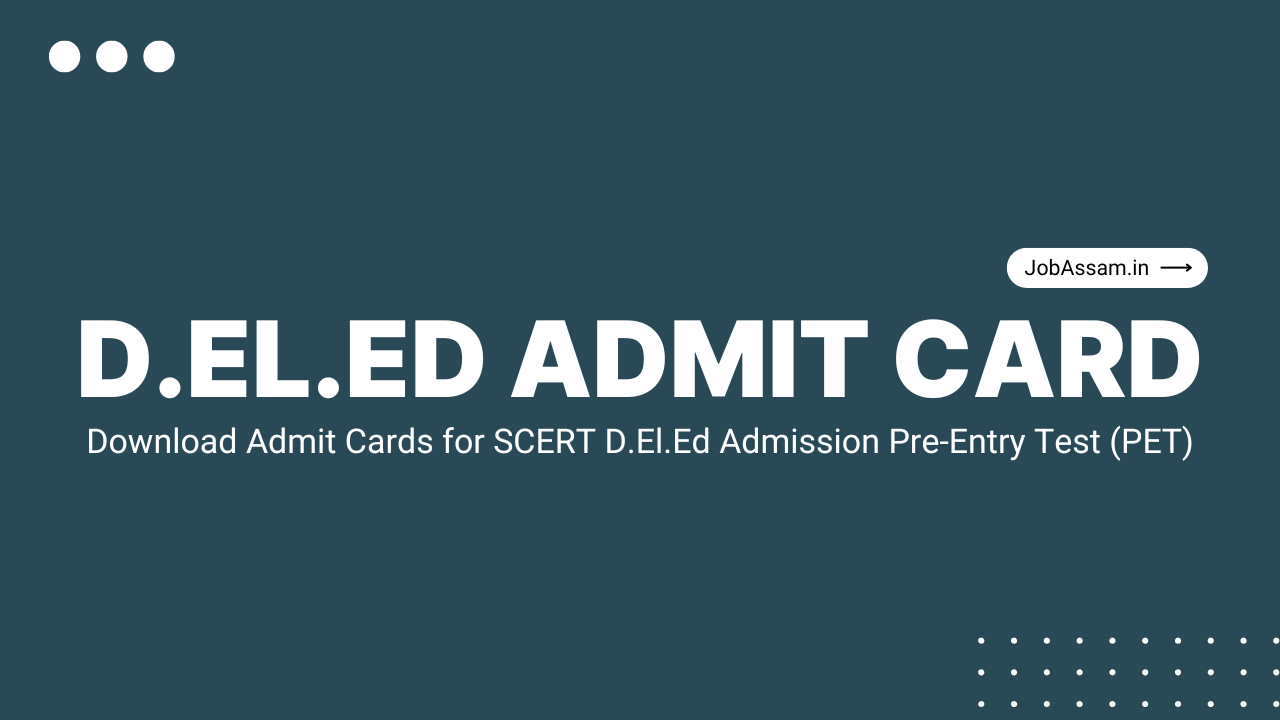| Exam Name | Pre-Entry Test |
| Exam Type | Entrance Exam |
| Course | D.El.Ed. |
| Organization | SCERT, Assam |
| Exam Date | 13 July 2025 |
| Admit Card Status | Not Issued |
| Issue Date | 5 July 2025 |
Assam D.El.Ed Admit Card 2025
The State Council of Educational Research and Training (SCERT), Assam, is set to conduct a Pre-Entry Test (PET) for admission to its Diploma in Elementary Education (D.El.Ed) program. This program is offered at various Government Teacher Education Institutes (TEIs) under SCERT’s supervision. According to the official notification, the Pre-Entry Test (PET) for Assam D.El.Ed Admission 2025 is scheduled for 13th July 2025, for all candidates who submitted online applications. The same official notification confirms that admit cards or hall tickets for the SCERT PET Exam will be available for download from 5th July 2025 on the official website.
SCERT D.El.Ed Admit Card Details
Exam Name: Pre-Entry Test (PET) 2025
Course Name: Diploma in Elementary Education (D.El.Ed.)
Academic Session: 2025-27
Organization: State Council of Educational Research and Training (SCERT)
Exam Date: 13 July 2025
Exam Duration: 2 Hours
Exam Centres: The Pre-Entry Test (PET) venue are allocated in the district selected by candidates during their application submission, with the exact location clearly mentioned on their admit cards.
Total Marks: 100 Marks
Total Questions: 100 Questions
Question Type: Multiple Choice Questions
Negative Marking: For every incorrect answer, a 0.25 mark shall be deducted from the total marks secured by the candidate. More than one answer given to a question will be treated as an incorrect answer.
Admit Card Status: Not Issued
Admit Card Issue Date: 5 July 2025
How to Download D.El.Ed Admit Card?
Candidates who have submitted online applications for the SCERT, Assam, entrance examination will be able to download their admit cards from the same web portal used for their application.
To log in, you will need your Registered Mobile Number and Date of Birth in YYYY-MM-DD format. Once successfully logged in, you will find an option to download your admit card. Simply click on this option, download the admit card in PDF format, and print it out for future use.
For your convenience, we have updated the direct link to the SCERT Admit Card portal in the Important Links section of this article, along with other relevant links.
Important Dates of Assam D.El.Ed Admission
| Notification Date | 18 May 2025 |
| Apply Start Date | 18 May 2025 |
| Apply End Date | 5 June 2025 |
| Admit Card | 5 July 2025 |
| PET Exam | 13 July 2025 |
| PET Result | 28 July 2025 |
Important Links of D.El.Ed Entrance Admit Card
| PET Admit Card | 05-07-2025 |
| Official Notification | Click Here |
| Information Brochure | Click Here |
| WhatsApp Channel | Click Here |
| Install Android App | Click Here |
| Official Website | Click Here |


